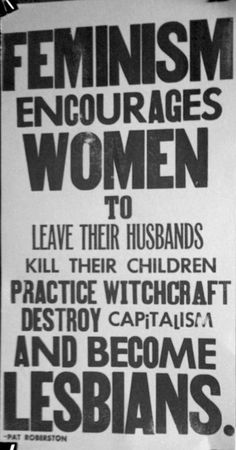Bring to mind the popular, stereotyped perception of feminists. Are you thinking about angry lesbians? Hairy legs? Female supremacists? These are a few of the many misconceptions about feminism and feminists. I would like to take this opportunity to debunk some common myths.
Feminism is defined by Merriam- Webster as “the belief that men and women should have equal rights and opportunities.” Most people would probably say they believe in gender equality. Interestingly, many of these same people do not identify as feminists. There seems to be a disconnect between the word and its meaning for these people.
For many people, the problem is the word itself. “Feminism” is derived in part from the word “female.” This may mislead people into thinking that feminism is only for women, and that feminists care only about the rights of women. This sort of thinking gives rise to common stereotypes of feminists, and is used by the political right to discredit feminism.

To do: Buy groceries. Visit Grandma. Destroy capitalism.
In reality, all different kinds of people identify as feminists. You might even have been one all along without even realizing it. There are many different kinds of feminism to accommodate the diversity within the movement. Most of these fit into two major categories: liberal feminism and radical feminism.
Liberal feminism seeks to better integrate women into existing societal structures, such as the government, education systems, and the workplace. We see this kind of feminism most frequently in the mainstream. When we see female representatives elected to the senate, or women taking the ranks of powerful CEOs, it is the result of liberal feminism.
Radical feminism, on the other hand, seeks to overthrow existing social structures, such as smash-the-patriarchy style. It focuses on the theory of patriarchy, which states that society as it functions now is inherently oppressive to women through a variety of social mechanisms. Radical feminists often hold egalitarian or Marxist beliefs; some believe that the concept of gender should be abolished, because there cannot be equality when people believe there are significant differences between men and women.

If only it were that easy…
These major categories of feminism are just two of a huge range of beliefs. Ecofeminism, transfeminism, anarcha-feminism, and womanism are but a few of the diverse viewpoints that make up the modern feminist movement. I believe that there is a form of feminism to suit everyone. I tend to agree with author and activist bell hooks’ famous title and mantra: Feminism is for Everybody!
Kim Adamski co-hosts a public affairs show on WHUS called Full Frontal Feminism with DJ KBham. Find more information on their Facebook page, facebook.com/fullfrontalfeminism.

